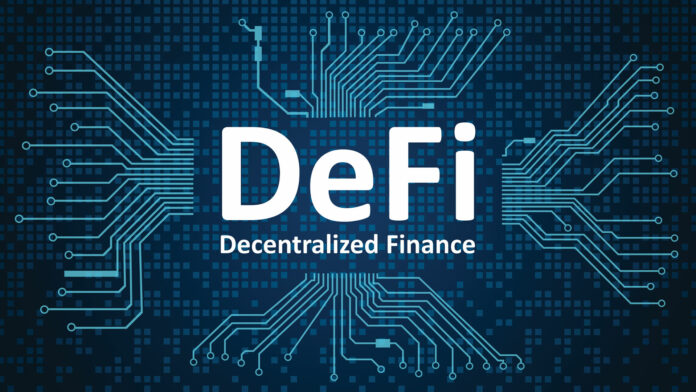Decentralized finance is becoming increasingly popular. To give an idea of its growth, there are now more than 4.8 million users of decentralized finance globally. Additionally, it is expected that about 78 million dollars are circulating in the entire DeFi ecosystem.
Nevertheless, it is a topic that still generates many questions. This field is continuously evolving, with new developments that require explanation. This article will discuss what DeFi platforms are, how they function, and their risks and benefits.
What is DeFi?
Decentralized finance, or ‘DeFi,’ refers to a blockchain-based system of financial services that eliminates the need for third-party or governmental approval of transactions. In other words, DeFi platforms act as a type of blockchain-based financial institution or banking system, allowing the trading of digital assets like cryptocurrencies without institutional transaction fees.
DeFi platforms are also part of a free, open-source digital marketplace that enables coders to innovate and develop their own decentralized applications, known as dApps. DeFi platforms can offer payment, investment and trading, insurance, asset management and lending services. Although DeFi can be very flashy with great benefits for users, it has its own risks.
How does DeFi work?
DeFi uses a technological blockchain ecosystem to bypass traditional financial services management systems and processes. For this, it uses digital wallets, smart contracts, digital agreements, and oracles.
As a decentralized system, DeFi utilizes a financial infrastructure composed of multiple computer networks, which serve as public ledgers and store digital transaction records.
The DeFi concept, still a novel idea, is continually adapted for use in loans, mortgages, and other banking products. This novel technology employs decentralized applications (dApps), which consist of hardware, software, and currencies. It enables users to lend, borrow, and trade cryptocurrencies without needing authorization from a third party or banking institution.
What are the Risks and Benefits of DeFi?
Decentralized finance offers a range of advantages and challenges. The following sections delve into these aspects, outlining both the opportunities it presents and the potential pitfalls to be aware of.
Risks of DeFi: Security Vulnerabilities and Hacking Threats
Although blockchain technology offers a high degree of security, DeFi is not exempt from any security-related risks.
Weaknesses in smart contracts can be exploited by hackers, which could result in loss of funds or theft of personal information.
Danger of Smart Contract Failures
Smart contracts are computer programs and, as such, are subject to both bugs and errors. An error in the code of a smart contract can have major financial consequences.
It is vitally important for developers to conduct thorough audits and rigorous testing prior to the implementation of smart contracts, and for users to analyze both the reliability and security of contracts and platforms.
Financial Risk and Volatility
DeFi is frequently linked to cryptocurrencies and tokens, which can be highly volatile. Platforms should be aware of and cognizant of the risks generated by market volatility and keep in mind that valuations of this digital asset class can fluctuate sharply in a short time.
Barriers to Entry and Complexity
DeFi can sometimes be complex and require specialized technical knowledge to be used efficiently and safely.
For this reason, it is vital to have the support of a specialized team to implement DeFi functionalities and simultaneously break down knowledge barriers for users.
Compliance and Regulation
DeFi can be complex and often requires specialized technical knowledge for efficient and safe use. This complexity can lead to uncertainty and legal risks for companies and users alike.
The Benefits of DeFi: Global Access
DeFi provides universally accessible, unrestricted financial services, which are especially advantageous for areas traditionally underserved by conventional banking systems. This global, barrier-free access democratizes financial opportunities, enabling broader economic participation and empowerment.
Ownership and Control of Digital Assets
Users have direct control over their assets, thereby eliminating the need for intermediaries or third parties to manage their finances and digital assets.
Security and Transparency
Transactions in DeFi are transparently recorded on the blockchain, which gives assurance of integrity and visibility of all transactions.
Decreased Costs and Efficiency
Smart contracts serve to automate financial processes, providing the possibility of greater efficiency in the execution of transactions, eliminating the need for intermediaries and in turn decreasing waiting costs.
Diversification and Innovation
The open and collaborative nature of the DeFi sector has spurred the development of a wide range of applications, from passive lending and insurance to decentralized exchanges and profit generation.
Financial Inclusion
By providing accessible and barrier-free financial services, DeFi can make it easy and fast for people to access credit, insurance and savings.
What is the Difference between DeFi and Cryptocurrencies?
Although cryptocurrencies are decentralized there are differences with DeFi. The value of a cryptocurrency such as bitcoin is stored within its own blockchain. On the other hand, DeFi is a marketplace that offers different cryptocurrencies on the Ethereum network.
With DeFi, cryptocurrency holders can lend their digital coins to generate interest. Another way is to take loans on the basis of the cryptocurrencies they have stored in their digital wallets.
Conclusion: Key Takeaways and Future Outlook
Throughout this article, we have talked about what DeFi platforms are, how they work, and what their benefits and risks are. Today thanks to blockchain technology there is no need for a third party to be able to make transfers or access information related to any financial asset such as cryptocurrencies.
This world offers a unique investment opportunity, though it carries high risks and requires significant technical knowledge to understand its workings. Likewise, as in everything else, investing in a digital asset will always be risky and that is why it is important to have good management and not to invest more than you can lose.



